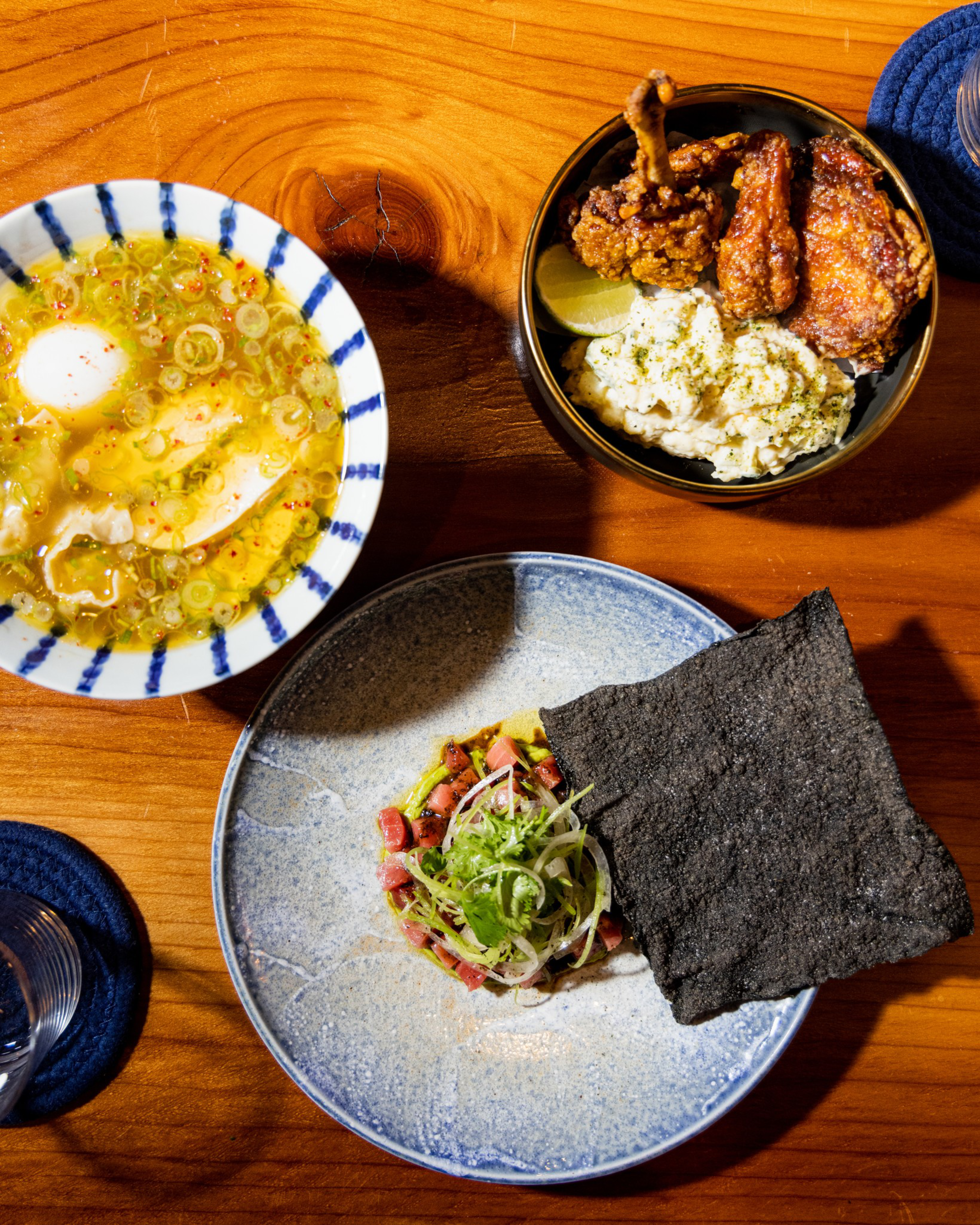This column is just a part of the Off Menu newsletter, where, every Wednesday, you’ll get restaurant news, gossip, tips, and hot takes. To sign up, visit The Standard’s newsletter page and select Off Menu. It’s free to subscribe!
Sometimes dinner is going splendidly — until it isn’t.
On a recent Sunday in Oakland’s Rockridge district, on the gushy recommendation of an industry friend, I booked a table for two at Oken, which opened at the end of May. It’s my kind of place: low‑key, thoughtful design, sweet servers, and a well-curated, Asian‑leaning menu — grilled gai lan with crispy garlic, maitake tempura, beef short-rib ssam. I wanted to order it all, and what we ate was terrific.
Service moved at a healthy clip but never felt rushed. My friend and I were rolling our eyes to the heavens over a devil’s food cake crowned with a soft‑serve‑ish swirl of sesame‑kinako cream when a manager appeared and — curtly — told us he needed the seats we were occupying at the communal table. Now. People were waiting, he said. And they were irritated.

I was confused, thinking maybe we’d done something wrong. Then stunned when I realized we hadn’t. It was 7:04 p.m. on a Sunday. We’d been there for 94 minutes. We weren’t in the middle of a game of Catan. We had a credit card out and the check in hand. No one had mentioned a time limit. My planned rave turned into a rant.
A few days later, I called chef‑owner Albert Ok to find out what, exactly, I’d missed. Turns out I wasn’t hallucinating; I just hadn’t squinted. The only timing note sits in tiny print at the bottom corner of the menu:
“Please be aware during peak business hours (6–8 p.m.), there are other reservations waiting for your table. Thank you for understanding!
Party of 2: 1.5 hours • Party of 3: 2 hours • Party of 5+: 2.5 hours”
Though this type of rule-making cuts against my preference for old-fashioned hospitality, on some level, I do understand it. Around the Bay, Bar Shiru, Besharam, Mochica, and Buddy post similar time limits on their reservation pages (though, admittedly, you have to pay attention to notice them). I suggested to Ok that his restaurant do the same — set expectations before people book. He sheepishly admitted his concern: If guests see a time limit, they won’t come.
Ok opened a counter-service spot called Ok’s Deli in 2022. Oken is his first go at a full-service restaurant. He spoke candidly: “When we opened, we were expecting a higher check average, and it turned out to be 15% to 20% lower than we projected. We just have to turn the tables to make it work for us financially.”

He’s far from alone. Even at places without explicit time limits, service lately feels like it’s moving at 2x speed. Increasingly, the tables where I dine are a sea of plates that have been dropped at once. It’s like speed-dating. The style of service right now is very, “Thank you, next.”
I’ve heard from countless operators that since the pandemic, diners’ preferred hours have narrowed — everyone wants the early-bird special — which means fewer turns for restaurants. As the earning window compresses and costs climb, more places are pushing the pace of service in an attempt to simply stay open.
Ok admitted that he hasn’t been focused on how the time limit is being communicated by staff. “I try to be relatively hands‑off. I have my hands full in the kitchen,” he said. Classic rookie trap. I’ve eaten at too many chef‑driven spots where obsessive care goes into the handmade ramen noodles but the front-of-house choreography is an afterthought. You’d think, given my deep commitment to eating, that I’d be food-first. But I have always said that service trumps cooking — and my night at Oken proves that.
But then came the part of our conversation that made my heart ache. “Pretty much everyone told me opening a restaurant is stupid nowadays — that there’s nothing advantageous or profitable unless you have corporate backing or a larger space,” Ok said, clarifying that Oken has not turned a profit. “I’m not a business person; I just enjoy making food.”
Where does that leave me and Albert Ok? Well, I definitely softened. I just ask that if his restaurant wants a 90‑minute limit, it should own it — on the booking page and at the host stand. And for the love of humanity, do it graciously. Because Oken, I loved your food — and I want to come back.
